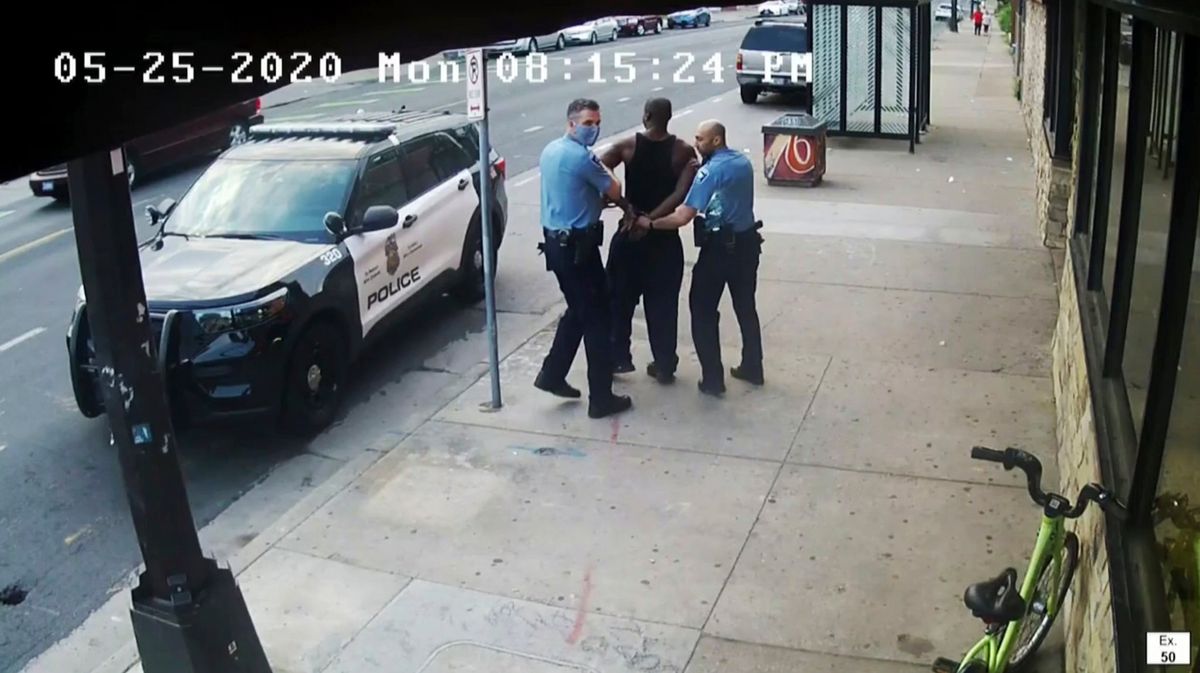Defense in Floyd’s killing: Death was a tragedy, not a crime

ST. PAUL, Minn. – A defense attorney at the federal trial of three Minneapolis police officers charged with violating George Floyd’s civil rights said during closing arguments Tuesday that Floyd’s death was a tragedy, but that doesn’t make it a crime.
Robert Paule said officers at the scene were doing what was best for Floyd – holding him until paramedics arrived. And he said his client, Tou Thao, did not willfully act “with a bad purpose or improper motive to disobey or disregard the law.”
Thao was watching bystanders and traffic as the other officers at the scene held down Floyd.
Thao, J. Alexander Kueng and Thomas Lane are charged with depriving Floyd of his right to medical care as Derek Chauvin pressed his knee into Floyd’s neck for 9½ minutes. Kueng and Thao are also charged with failing to intervene to stop Chauvin during the May 25, 2020, killing that triggered protests worldwide and a reexamination of racism and policing.
Earlier, prosecutor Manda Sertich singled out each former officer as the government wrapped up its case in the monthlong trial.
Thao stared directly at Chauvin and ignored bystanders’ pleas to help a man who was dying “right before their eyes,” Sertich said.
She said Kueng, who knelt on Floyd’s back, casually picked gravel from a police SUV’s tire as Chauvin “mocked George Floyd’s pleas by saying it took a heck of a lot of oxygen to keep talking.”
And Lane, who held Floyd’s feet, voiced concerns that showed he knew Floyd was in distress but “did nothing to give Mr. Floyd the medical aid he knew Mr. Floyd so desperately needed,” the prosecutor said.
Prosecutors have argued that the officers violated their training by not rolling Floyd onto his side or giving him CPR.
Sertich discounted Lane’s attempt to perform CPR after an ambulance arrived, saying the officers did nothing for 2½ “precious minutes” after Floyd became unresponsive and before paramedics got there.
“They chose to do nothing, and their choice resulted in Mr. Floyd’s death,” she said.
Defense attorneys have argued that the Minneapolis Police Department’s training was inadequate. They also have attacked a police culture that they said teaches officers to defer to their seniors, saying Chauvin called all the shots at the scene. Lane and Kueng were both rookies.
But Sertich rejected those arguments: “Officer Chauvin isn’t ordering these defendants around, he’s barely talking to them,” she said. “The officers knew George Floyd couldn’t breathe, and was dying.”
The prosecutor ran through the elements necessary to prove that Thao and Kueng failed to intervene, saying they did nothing, “not one statement, not one gesture, not one physical intervention,” to stop Chauvin. She also highlighted Thao’s status as a veteran officer: “He certainly had the means to save Chauvin from himself.”
Both counts include language that the officers “willfully” deprived Floyd of his constitutional rights.
On the intervention charge, she said, prosecutors merely had to prove that the officers knew the force Chauvin was using was unreasonable and that they had a duty to stop it but didn’t. On the charge that Floyd was denied medical care, the fact that the officers knew Floyd was in distress but did nothing is proof of willfulness, she said.
Sertich contrasted the officers’ inaction with the desperate cries of bystanders pleading with them to get off Floyd and to check for a pulse: “Even though they had no power, no authority, no obligation, they knew they had to do something.”
Those bystanders, Sertich said, gave Thao and Kueng “play by play commentary” that should have raised their awareness that Floyd was in trouble – shouting that Floyd could not breathe, that he wasn’t responsive and urging the officers to look at him.
“Anyone … can recognize that someone with a knee on their neck, who has slowly lost their ability to speak, stopped moving and has gone unconscious has a serious medical need,” Sertich said, urging jurors to review videos of what happened.
During the trial, Lane testified that he asked twice if Floyd should be rolled over but was rebuffed, and that he held his position because an ambulance was on the way.
Kueng testified that Chauvin was his former training officer and that he had considerable sway over his career. He said he trusted Chauvin’s advice.
Thao testified that he was watching the bystanders and he trusted that the officers behind him were caring for Floyd.
Chauvin pleaded guilty in the federal case in December, months after he was convicted of state murder and manslaughter charges.
At the start of the trial, U.S. District Judge Paul Magnuson selected 18 jurors, including six alternates. Fourteen remain: 12 who will deliberate and two alternates. A jury that appears to be all white will consider the case after a juror who appeared to be Asian American was dismissed Tuesday morning without explanation. The court did not release demographic information.
Lane, who is white, Kueng, who is Black, and Thao, who is Hmong American, also face a separate trial in June on state charges alleging that they aided and abetted murder and manslaughter.
The trial was wrapping up just as another major civil rights trial in Georgia resulted in the conviction of three white men on hate crimes charges in the death of Ahmaud Arbery, a 25-year-old Black man who was chased and shot in February 2020. {table class=”x-toolbar-ct” cellspacing=”0”}{td class=”x-toolbar-left” align=”left”}
{/table}{/div}{/div}{/div}{/div}{/div}{/div}{/div}{/div}{/div}{/form}{/div}{/div}{/div}{/div}{/div}